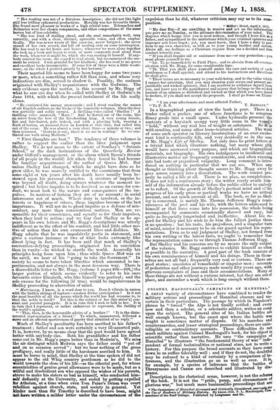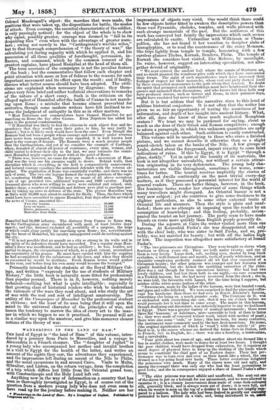COLONEL MACDOUGALL'S CAMPAIGNS OF HANNIBAL. * A GREAT variety of circumstances
have combined to render the military actions and proceedings of Hannibal obscure and un- certain in their particulars. The passage by which in Napoleon's phrase he "forced" the Alps is not finally settled ; and every now and then a scholar, or a scholastic soldier, writes an essay upon the subject. The general sites of his Italian battles are well enough known, but the exact spot where the battle was fought is sometimes matter of dispute. Of his marches and countermarches, and lesser strategical proceedings, there are unin- telligible or contradictory accounts. These difficulties do not much militate against Colonel Macdougall's book, for his object is scientific rather than narrative. He uses "the campaigns of Hannibal" to illustrate "the fundamental theory of war" hub pendent of formal technicalities or national aims, not to write a history. For this purpose the broad accounts as they have come down to us suffice tolerably well ; and if they do not, the doubtful may be reduced to a kind of certainty by a comparison of in- ferenees, and, the illustration go on as well as ever. It is, for example, by a species of inference that the battles of Thrasymene and Canute are described and illustrated by dia- Varna. Description in the rhetorical sense, however, is not the scheme of the book. It is not the "pride, pomp, and circumstance of glorious war," but much more businesslike proceedings that are • The Campaigns of Hannibal Arranged and Critically Considered, erpratatftw the Use of Students of Military History. By Lieut.-Col. P. L. Macdougall, coo mandant of the Staff Oollege. Published by Lougmans and 0o. Colonel Idacdougall's object : the marches that were made, the posit ens that were taken up, the dispositions for battle, the modes of attack. Even courage, the essential characteristic of the soldier, is only passingly noticed ; for the object of the whole is to show why equal, possibly greater, courage was doomed to "fall in its despairing files " even when with the advantage of greater num- bers ; owing not merely to the "Carthaginian's warlike wiles," but to that thorough comprehension of "the theory of war," the calculating yet daring sagacity with which he applied it, and his possession of all those qualities of forethought, persuasion, in- fluence, and command, which by the common consent of the greatest captains, have placed Hannibal at the head of them all.
The terse accounts of the campaigns is not the peculiar feature of the book ; but the commentaries that follow each chapter and point attention with more or less of fulness to the reasons for each important movement and its effect upon the result; and if faulty, discuss what better course should have been adopted. The criti- cisms are explained when necessary by diagrams ; they them- selves vary from brief and rather technical observations to remarks of the nature of a short essay. Such is the criticism on the alleged nglect of Hannibal after the battle of Cannte in not march- ing upon Rome ; a mistake that became almost proverbial for centuries, though some modern writers have felt inclined to re- verse the judgment of antiquity in this as in other matters.
6, Most historians and commentators have blamed Hannibal for not marching on Rome the day after Canine. Even Napoleon has added his voice to the general condemnation.
"If Hannibal was likely to find the citizens in such abject fear and de- spondency that they would open their gates to him, he may justly be blamed; but is it likely such would have been the case? Even though the Romans had not been a people whose courage and constancy under reverses have never been surpassed, hardly ever equalled, it is well known how great is the courage of despair. The Romans were a much greater people than the Carthaginians, and yet if we consider the example of Carthage, when, denuded of almost all power of resistance, every man, woman, and child united to defend their city to the last, we may estimate the resist- ance Hannibal might expect to meet with at the gates of Rome.
"There was, however, no cause for despair. Such a movement of Han- nibal was the very one his enemies ought to desire. Behind walls, that discipline which is everything in the field is comparatively unnecessary, and natural courage equalizes the untrained defender with the veteran as- sailant. The population of Rome was essentially warlike, and there was no lack of arms. The two city legions formed the regular garrison of the capi- tal, numbering 10,000 men. The levy en masse of all above seventeen years of age provided two additional legions and 1000 cavalry. Eight thousand slaves who were willing to serve were enlisted and armed, and, besides these, a number of criminals and debtors were glad to purchase par- don by taking up arms in defence of the state. The prmtor Marcellus was at Ostia with 10,000 men about to embark for Sicily. Thus, the force which could have been assembled to oppose Hannibal, four days after the arrival of the news of Cannm, amounted to—
Two city legions 10,000 Levy en masse 11,G00 Slaves, prisoners, Sze 12,000 Marcellus from Ostia 10,000 43,000
Hannibal had 34,000 infantry. The distance from Cannm to Rome was, for the Carthaginian army encumbered with spoil, at least twelve days' march ; and this distance excluded all possibility of a surprise, the hope of which could alone justify his marching upon Rome ; for, notwithstand- ing the boast of Maharbal, his cavalry unsupported could do nothing against the city. "It is not possible that an assault on a city so strong in its walls and in the spirit of its defenders should have succeeded. For a regular siege Han- nibal's force was insufficient, and he had no artillery ; he was, besides, not partial to sieges, the circumstances of which, to a great extent, neutralized the superiority of his genius. He must have carried with him the supplies he had accumulated for the subsistence of his force, and when they should be consumed he would be destitute. Fresh Roman levies would gather on his rear, and before long his own army would become the besieged."
Primarily intended for the students at the Royal Military Col- lege, and written "expressly for the use of students of Military History," the little book is naturally, more fitted for professional than popular perusal. There is in it, however, nothing merely technical—nothing but what is quite intelligible ; especially to that growing class of historical readers who wish to understand the rationale of the wars they read about, and who study the art of war with the zeal and zest of intelligent amateurship. The utility of the Campaigns of Hannibal to the professional student is obvious ; not the least of its uses being that it will open the mind to the universal character of the principles of war, and lessen the tendency to narrow the idea of every art to the man- ner in which we happen to see it practised. Its perusal will act in a similar way upon the amateur, and give him moreover clearer notions of the theory of war.



































 Previous page
Previous page